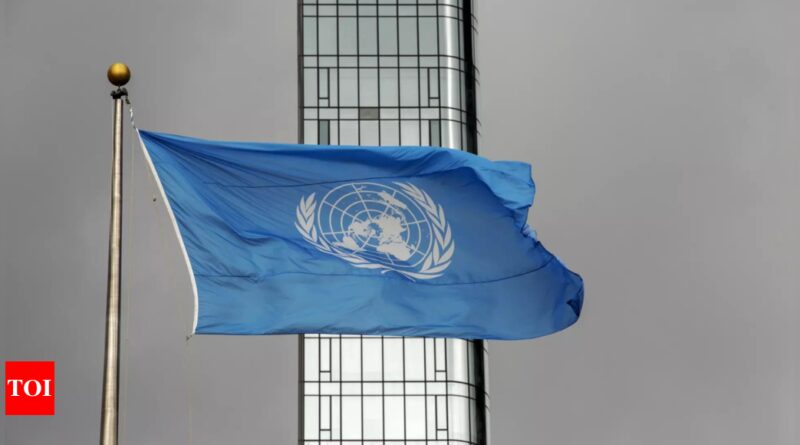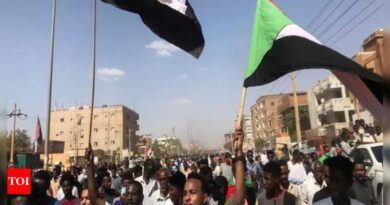15 UN peacekeepers in a convoy withdrawing from northern Mali were injured by 2 explosive devices – Times of India
UNITED NATIONS: Fifteen UN peacekeepers in a convoy withdrawing from a rebel stronghold in northern Mali were injured when vehicles hit improvised explosive devices on two occasions this week, the United Nations said on Friday. UN spokesman Stephane Dujarric said eight peacekeepers injured Wednesday were evacuated by air and “are now reported to be in stable condition.”
He said seven peacekeepers injured by an IED early Friday also were evacuated by air.He did not give their conditions.
Dujarric said the peacekeepers, who were withdrawing weeks earlier than planned because of growing insecurity, suffered two other IED attacks after leaving their base in Kidal on October 31.
JNIM, an extremist group with links to al-Qaida, claimed responsibility for the earlier attacks, in which at least two peacekeepers were injured.
Dujarric said the UN doesn’t know if the IEDs that hit the convoy had been there for a long time or whether the peacekeepers were deliberately targeted. The convoy is heading to Gao on the east bank of the Niger River, and “it’s clear what road they will use,” he said.
He said the UN hoped the convoy would complete the estimated 350-kilometre journey to Gao, a staging point for peacekeeping departures, by the end of the weekend.
In June, Mali’s military junta, which overthrew the democratically elected president in 2021, ordered the nearly 15,000-strong UN peacekeeping force known as MINUSMA to leave after a decade of working on stemming a jihadi insurgency.
The UN Security Council terminated the mission’s mandate June 30 and the UN is in the throes of what Secretary-General Antonio Guterres calls an “unprecedented” six-month exit from Mali by December 31.
MINUSMA was one of the most dangerous UN peacekeeping operations in the world, with more than 300 members killed since operations began in 2013.
About 850 UN peacekeepers had been based in Kidal along with 150 other mission personnel. An employee with MINUSMA earlier told The Associated Press that the peacekeepers left Kidal in convoys after Mali’s junta refused to authorize flights to repatriate UN equipment and civilian personnel.
Although noting the junta allowed the medical evacuation flights, Dujarric said, “We’re not operating as many flights as we should be able to operate in order to up the safety of our peacekeepers who are moving on the ground.”
After the convoy left Kidal the town was taken over by ethnic Tuareg rebels, who have been clashing with Mali’s military. The spike in those clashes prompted the UN to move up its departure from Kidal, once planned for mid-November.
Analysts say the violence signals the breakdown of a 2015 peace agreement between the government and the rebels. That deal was signed after Tuareg rebels drove security forces out of northern Mali in 2012 as they sought to create an independent state they call Azawad.
He said seven peacekeepers injured by an IED early Friday also were evacuated by air.He did not give their conditions.
Dujarric said the peacekeepers, who were withdrawing weeks earlier than planned because of growing insecurity, suffered two other IED attacks after leaving their base in Kidal on October 31.
JNIM, an extremist group with links to al-Qaida, claimed responsibility for the earlier attacks, in which at least two peacekeepers were injured.
Dujarric said the UN doesn’t know if the IEDs that hit the convoy had been there for a long time or whether the peacekeepers were deliberately targeted. The convoy is heading to Gao on the east bank of the Niger River, and “it’s clear what road they will use,” he said.
He said the UN hoped the convoy would complete the estimated 350-kilometre journey to Gao, a staging point for peacekeeping departures, by the end of the weekend.
In June, Mali’s military junta, which overthrew the democratically elected president in 2021, ordered the nearly 15,000-strong UN peacekeeping force known as MINUSMA to leave after a decade of working on stemming a jihadi insurgency.
The UN Security Council terminated the mission’s mandate June 30 and the UN is in the throes of what Secretary-General Antonio Guterres calls an “unprecedented” six-month exit from Mali by December 31.
MINUSMA was one of the most dangerous UN peacekeeping operations in the world, with more than 300 members killed since operations began in 2013.
About 850 UN peacekeepers had been based in Kidal along with 150 other mission personnel. An employee with MINUSMA earlier told The Associated Press that the peacekeepers left Kidal in convoys after Mali’s junta refused to authorize flights to repatriate UN equipment and civilian personnel.
Although noting the junta allowed the medical evacuation flights, Dujarric said, “We’re not operating as many flights as we should be able to operate in order to up the safety of our peacekeepers who are moving on the ground.”
After the convoy left Kidal the town was taken over by ethnic Tuareg rebels, who have been clashing with Mali’s military. The spike in those clashes prompted the UN to move up its departure from Kidal, once planned for mid-November.
Analysts say the violence signals the breakdown of a 2015 peace agreement between the government and the rebels. That deal was signed after Tuareg rebels drove security forces out of northern Mali in 2012 as they sought to create an independent state they call Azawad.




